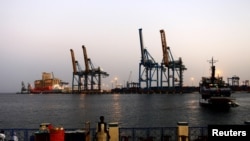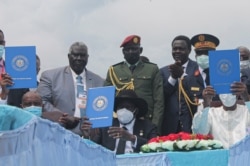Leaders of a group of protesters in Sudan's Red Sea state that had blocked the main road linking Khartoum to oil facilities in Port Sudan town for two straight days called off the protest on Wednesday.
The protest leaders released a statement Tuesday saying all roads, oil facilities and ports would be reopened after Sudan's security and defense council met and agreed to send a delegation headed by Sovereign Council member General Ibrahim Jabir to the area to meet with leaders of the Beja community and resolve their issues.
The protesters rejected what's been called "the eastern track" of the recently signed Sudan peace deal between the government and armed rebel groups in Juba.
Protesters killed a police officer on Monday at oil field facilities in Haiya town, some 208 km from Port Sudan, according to eyewitnesses. Armed with spears, knives and sticks, the protesters attacked several oil facilities in the area, forcing oil companies to shut down operations.
The protesters said the peace deal signed on Saturday does not protect their rights.
The Beja Congress of Eastern Sudan was one of nine rebel groups that formed an umbrella group called the Revolutionary Front, which took part in the Sudan peace talks.
Abdallah Obshar, an intellectual with the Beja tribe and a protest organizer, accused supporters of ousted president Omar al-Bashir, whom he said were of Eritrean origin, of trying to use the agreement to take over their land.
"The eastern track signed in Juba is a clear encroachment to the Beja tribe because the group which represented eastern Sudan during the negotiations have not had any relationships with the area whatsoever. They are a group of individuals which had been receiving support from the previous administration to change the demography of the Beja area," Obshar told South Sudan in Focus from Port Sudan.
The Beja people are an ethnic Cushitic nomadic people who inhabit Sudan, Egypt and neighboring Eritrea. The Beja people primarily live between the Red Sea coast and the River Nile in Sudan.
Obshar said the group representing eastern Sudan at the talks had no historical or geographical ties to eastern Sudan and do not even speak the Beja language.
"Our area has been witnessing marginalization and exclusion since the independence of the country; it is still being practiced against our people, and the worst is now they are trying to change our demography and do away with our identity. This is one of the dangerous series of plans that is facing the people of eastern Sudan," Obshar told VOA.
The deal mediated in Juba by South Sudan President Salva Kiir ends years of conflict in eastern Sudan, Blue Nile and Sudan's western region of Darfur.
Deteriorating living conditions have contributed to the escalating violence that led up to this week's protests, said Port Sudan resident Ibtisam Mohammed Saleh.
"I went to the southern port to finish some of the customs clearance of my goods, and it closed. The road leading to the port was blocked, and I could see total paralysis in the port. I have to drive back home. Yesterday there was a series of protests demanding that the current transitional government should be removed," Saleh told South Sudan in Focus.





